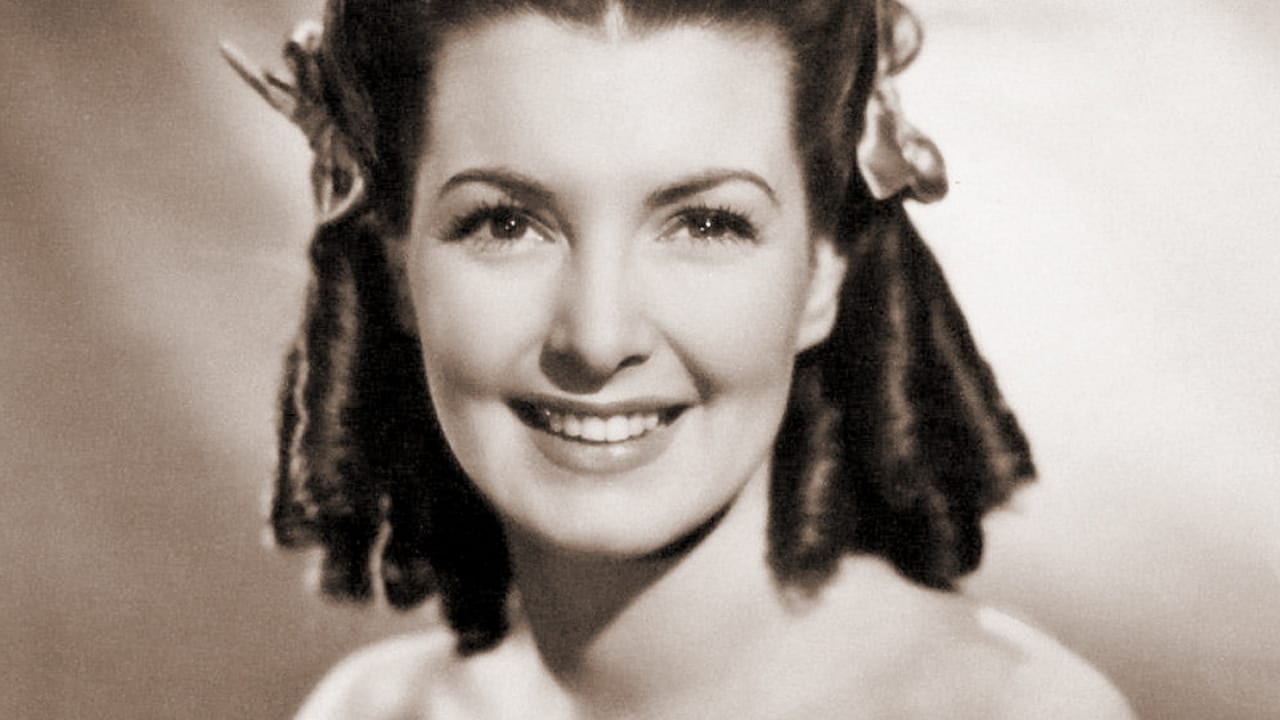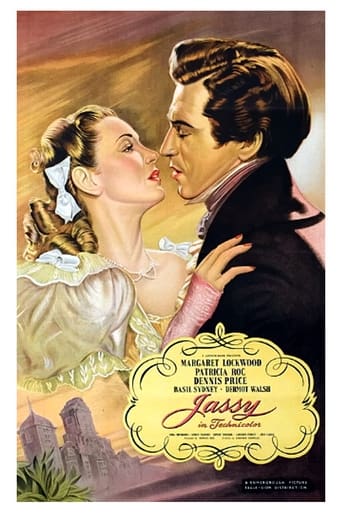



A story that's too fascinating to pass by...
Great example of an old-fashioned, pure-at-heart escapist event movie that doesn't pretend to be anything that it's not and has boat loads of fun being its own ludicrous self.
View MoreIt's a movie as timely as it is provocative and amazingly, for much of its running time, it is weirdly funny.
View MoreAn old-fashioned movie made with new-fashioned finesse.
View More"Jassy" was one of a number of historical melodramas made in Britain by Gainsborough Pictures during the 1940s. ("The Wicked Lady" is another well-known example). The action takes place in the early nineteenth century. The main characters are Christopher Hatton, a country squire, Nicholas Helmar, another wealthy gentleman, Hatton's son Barney, Helmar's attractive but flighty daughter Dilys and the title character Jassy Woodroffe, a beautiful gypsy girl. Jassy has the gift of second sight, something which causes her to be regarded as a witch by local people, who want to throw her into the village duckpond to see if she floats or not. (Witchcraft had officially ceased to be regarded as a crime in Britain in 1735, but folk-superstitions like this died hard. The last extra-judicial killing of a suspected witch took place, according to some accounts, as recently as 1945).The name "Jassy" is short for "Jacinth"; it is not a corruption of "Jessie". She claims that her name is taken from the Bible, and although there is no Biblical character named Jacinth the word is used in the Bible, at least in some translations, to mean a type of jewel.The plot goes though too many twists and turns for me to set out anything like a full synopsis here. The film opens with Hatton, an obsessive gambler, losing his stately home, Moderlaine, to Helmar while gambling. Much of the story revolves around Barney Hatton's attempts to regain Moderlaine for his family, as well as his romantic liaisons with both Jassy and Dilys Helmar. Along the way there is also a suicide, an attempted elopement, an unexpected marriage, a murder, another killing (which could be either murder or manslaughter but in respect of which the perpetrator is never prosecuted) and a dramatic trial scene.As was normal with Gainsborough melodramas (indeed, with melodramas in general), the acting is exaggerated and stylised. In some contexts over-acting can be a vice, but in a film like this one it is what we have come to expect- so much so that anyone attempting to give a naturalistic performance would look out-of-place. Margaret Lockwood, who also starred in "The Wicked Lady", makes Jassy an appealing heroine, not only beautiful but also spirited, intelligent and capable. Perhaps the best performance comes from Basil Sydney as Nicholas Helmar, a wicked Squire Jasper in the best melodramatic tradition.Most Gainsborough films were made in black-and-white, as were some American historical melodramas, such as "Dragonwyck", from the same period. The use of monochrome for costume dramas, a genre which seems to cry out for bold colours, must seem very strange to the modern viewer, but in the 1940s the economics of film production was very different to what it is now. The use of expensive colour film could add a considerable amount to the cost of a movie, a cost which could not always be recouped at the box office. Although there were some notable exceptions, such as Olivier's "Henry V", this was particularly true of Britain during the economic privations of the wartime years.By 1947, however, the war was over and, although complete economic recovery was still a long way off, some film-makers felt they could be more adventurous. Jassy" was made in Technicolor, which on this occasion did pay off, both economically- the film was a box-office hit- and artistically because the use of colour really does add a dimension to the film which it would otherwise have lacked. With its exciting, incident-packed plot, its lovely heroine, its detestable villain and a happy ending "Jassy" is a fine example of the historical melodrama. 7/10 Some goofs. To judge from the costumes the action of this film would appear to take place during the 1820s or 1830s. Before the passing of the Married Women's Property Acts or 1870 and 1882 married women could not own property in their own right, so one of the key plot points- Jassy's agreement to marry Helmar if he will make Moderlaine over to her- just does not work in a legal sense. Even if he had transferred the land to her while she was still single, it would have reverted to him as soon as they married. The version of the Royal Arms we see displayed in court during the trial scene was one which had ceased to be used in 1801.
View MoreAs a cameraman Bernard Knowles worked on some decent British films from the Silent Era through to Talkies but may have been misguided in taking on the role of Director and with only a handful of features to his credit, mostly unsatisfying - Easy Money for example - he saw out his career behind the camera on television series. Jassy came at the tail-end of the Gainsborough years and was the first time the outfit had utilised Technicolor. It's a bit of a dog's breakfast all round, never really convincing in ANY genre it flirts with. Basil Sydney, stepping into a role that James Mason could have phoned in, gave no indication that within the year he would be turning in a fine Claudius opposite Olivier's Hamlet, Margaret Lockwood DOES phone in her titular role and Patricia Roc and Dermot Walsh make no real attempt to offer anything other than cardboard cutouts. It was apparently savaged by the critics but popular with the masses at the time; well, they HAD just been through a major war.
View MoreUltimately, I was left rather disappointed in "Jassy" after a promising start. I think this is not helped by the way that the title character is the last of all to appear (in somewhat unconvincing 'dirty' make-up). Up to this point the plot has been unequivocally centred around young Barney Hatton; the audience is now expected to do a U-turn and enlist its emotions on the part of someone completely different, as the plot sets off cross-country in pursuit of Jassy's odyssey instead. It is not until some considerable time and a good deal of social-climbing have passed that we see anything again of the complex web of characters who seemed so important at the start...What I found disorienting was that the film seemed to keep switching allegiances in this manner throughout, which made it hard in the final analysis to become emotionally attached to any of the characters; by the end none of them seemed very likable, although I assume we were supposed to be on Jassy's side. The characters keep shifting -- good, bad, indifferent -- in what at first impressed me as a refusal to stereotype Nick Helmar, for example, as the villain of the piece, but ended up feeling like random inconsistencies bestowed for the sake of the plot.The scenario didn't come across as particularly well-rooted in the social realities of the era (or even of the genre) either. With one hand it emphasises the sacred priority of 'debts of honour' incurred at the gaming-table; but then with the other it expects us to believe that a man detected cheating at cards would be considered hard-done-by when his host *merely* tossed a glass of wine in his face. Such a sin, on the contrary, attracted utter social condemnation -- small wonder that Chris Hatton (Dennis Price, perhaps the most watchable player in the film) takes his own life... but scarcely as a result of the insult!Likewise, "Jassy" displays a good deal of wordless appreciation of the long hours and hard work expected of a 'tweeny', and the selfishness of the upper-class schoolgirls who expect her to sacrifice her brief nights to their escapades -- but then appears oblivious to the social cataclysm that threatens when Helmar's daughter attempts to pass off a serving-maid as a house guest and her father recognises the girl's name. Not only does Nick not turn a hair at discovering that his guest is the daughter of the rabble-rousing peasant leader who once berated him at the head of a mob on his own doorstep, but instead of throwing her out as a common impostor he actually apologises to her, which the script evidently considers the very least he could do. And apparently nobody in the village so much as blinks at seeing a raggedy ex-dairymaid elevated over them all as lady of the manor, without the slightest attempt to hide her origins.(I was also very frustrated by an apparent plot hole, in that a never-consummated marriage would not have been legally binding on the husband -- a very foolish trick for Jassy to play!)The love-affair with Barney, supposed to be the lynch-pin of the plot but rarely evident, failed to convince me. Dilys Helmar, introduced as a sympathetic character and ultimately used as an example of a mercenary bitch, had me completely confused, as did her father Nick, alternating between pettiness, random violence, and rare humanity.In a better film these contradictions would be an indication of great skill, but here, alas, they come across as signs of arbitrary incompetence. If you really want a 'gorgeous English film from the 40s', try "The Wicked Lady", "Blanche Fury" (in many ways similar) or "Fanny by Gaslight" for authentic melodrama and Gainsborough swagger: by comparison I'm afraid "Jassy" is a bit of a mess.
View MoreMy comments are brief: Whoever owns the rights to distribute "Jassy" should get their butts in gear and release this colorfully stylish, wistful feature to DVD pronto! Americans (of which I am one) are generally (and shamelessly) content to glut themselves on Hollywood-based product (whether good or not), and continually ignore hallmarks of English cinema. "Jassy" (and "Blanche Fury", another jewel buried away in some vault) are overdue their chance to titillate new audiences and deserve to be released to DVD. Roan? Anchor Bay? Criterion Collection?HeloooOOOO!...
View More